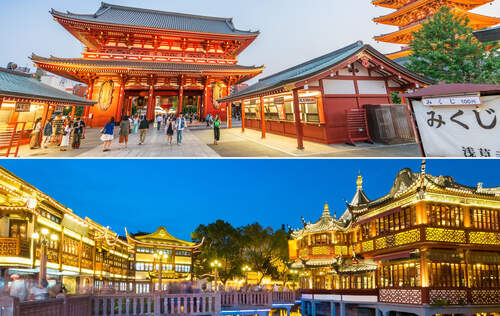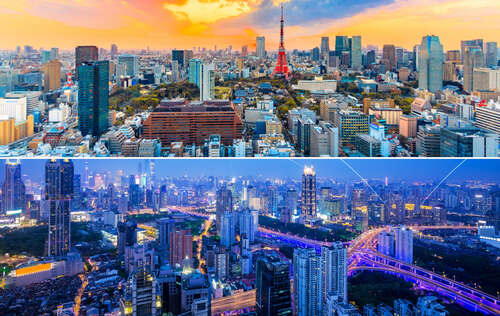
In the urban landscapes of Shanghai vs Tokyo, opportunities abound, beckoning job seekers and residents with promises of dynamic careers and vibrant lifestyles.
This comparison between Tokyo Japan and Shanghai China delves into various aspects of life in these two global cities, exploring their job markets, costs of living, safety, healthcare, transportation, housing, population density, expat communities, landmarks, tourist friendliness, and environmental initiatives.
From employment prospects to environmental sustainability, Tokyo and Shanghai stand as emblematic hubs of modernity, offering unique experiences and challenges to residents and visitors alike.
Unveiling Opportunities: Job Markets in Tokyo and Shanghai
Tokyo, an economic powerhouse, beckons with diverse job prospects spanning technology, finance, fashion, and hospitality. Multinational giants, startups, and traditional enterprises thrive amid its cosmopolitan vibe and cutting-edge infrastructure, drawing job seekers worldwide.
Conversely, Shanghai, a global financial epicenter, mirrors Tokyo’s allure with abundant employment opportunities in finance, tech, and manufacturing. Its dynamic job market, fueled by multinational corporations and burgeoning startups, attracts expats, particularly in education, such as in English teaching roles.
When contrasting Tokyo and Shanghai, both cities boast vibrant job landscapes across key sectors. While Tokyo shines with its technological innovation and diverse industry offerings, Shanghai’s financial prowess and manufacturing prowess create a compelling magnet for job seekers seeking opportunities in a global business hub.
Economic Landscapes: Shanghai and Tokyo Unveiled
Tokyo stands as a symbol of urban luxury with its renowned high cost of living. Boasting advanced infrastructure and world-class amenities, it’s among the world’s most expensive cities. Despite the price tag, Tokyo’s exceptional quality of life and rich cultural experiences continue to allure residents and visitors alike.
In comparison, Shanghai shares Tokyo’s high cost of living reputation. The cost of living in Shanghai is characterized by pricey housing, dining, and entertainment options, a blend of extravagance and affordability.
While luxury goods come with a premium price tag, public transportation and local groceries remain relatively affordable, catering to diverse lifestyles in Shanghai.
Comparing Average Incomes: Shanghai vs Tokyo
In Tokyo, Japan’s capital, residents enjoy an impressive average income, with salaries averaging around 5.24 million yen (approximately $48,000) as of 2021. This figure reflects Tokyo’s status as a global economic hub and its high cost of living.
Conversely, Shanghai, China’s economic powerhouse, has a notably high average income compared to other cities. In 2020, the average annual disposable income was approximately 72,232 yuan (around $11,000), showcasing the city’s economic growth and commitment to high living standards all over China.
However, income levels may vary across different sectors and job roles in both cities.
Safety First: A Look at Security in Tokyo and Shanghai
Tokyo boasts an impressive safety record and is consistently ranked as one of the world’s safest cities due to its low crime rates. Despite its dense population, Tokyo maintains order and security, offering residents and tourists alike a comfortable and secure environment.
Shanghai is also known for its safety, low crime rates, and secure atmosphere. Equipped with an advanced surveillance system and stringent law enforcement, Shanghai ensures public safety, with violent crimes being rare occurrences.
While petty crimes like pickpocketing may happen, both visitors and residents can enjoy city life with peace of mind.
Healthcare Services: Shanghai vs Tokyo Medical Facilities
Tokyo is renowned for its healthcare facilities, offering cutting-edge technology, skilled medical professionals, and a wide range of specialties. Its robust public healthcare system, coupled with private clinics, ensures accessible and efficient medical care for residents and visitors alike.
In comparison, Shanghai has both public and private hospitals. These institutions provide high-quality medical services equipped with modern technology and staffed by internationally-trained professionals, offering comprehensive healthcare from general care to specialized treatments for all individuals.
Transportation Systems: Navigating Shanghai and Tokyo
Tokyo’s transportation system is celebrated for its efficiency and punctuality, boasting an extensive network of subways, buses, and the iconic Shinkansen bullet trains. Despite its complexity, it remains user-friendly with English signage and announcements, showcasing Japan’s technological prowess and meticulous organization.
Shanghai boasts a cutting-edge transportation system that leaves no commuter stranded. From a vast network of metro lines and buses to the ever-ready taxis and ferries, getting around the city is a breeze. Couple that with one of the world’s busiest ports and international airports, and you have a recipe for seamless travel experiences.
Shanghai’s modern infrastructure doesn’t just connect residents to their destinations; it weaves together the city fabric, making it easily accessible and effortlessly connected for both locals and visitors alike.
Comparing Accommodation in Shanghai vs Tokyo
Tokyo grapples with housing challenges due to skyrocketing prices and limited space, despite government efforts to increase supply. The high demand inflates prices, making affordable housing elusive for many residents.
Similarly, Shanghai faces a housing market defined by high demand and limited supply, resulting in steep prices. Despite government initiatives to improve affordability, both locals and expats struggle to find reasonably priced accommodations, highlighting the significant issue of housing accessibility in both cities.
Population Dynamics: Shanghai and Tokyo Demographics
Tokyo, Japan’s capital, stands as the world’s most populous metropolis, housing over 37 million people at a staggering density of approximately 6,158 people per square kilometer. This urban landscape buzzes with incessant human activity, embodying Tokyo’s dynamic essence.
Meanwhile, Shanghai, China’s bustling metropolis, is home to over 24 million residents, reflecting its status as a global financial hub and vital shipping port and underscoring its pivotal role internationally.
Expat Experiences: Communities in Tokyo and Shanghai
In Tokyo, Japan’s capital, a diverse expatriate and foreigner population calls it home, with approximately 550,000 registered foreigners making up about 4% of the city’s total population as of 2020. This multicultural blend enriches Tokyo’s international atmosphere, contributing to its unique charm.
Living in Shanghai compared to Japan Tokyo, boasts a vibrant expat community, with over 200,000 residents from diverse backgrounds as of 2020. Their presence enriches the city’s cosmopolitan vibe, contributing to its global appeal and cultural diversity.
Iconic Landmarks: Exploring Tokyo and Shanghai’s Architectural Marvels

In Tokyo, Japan’s capital, experience a fusion of modernity and tradition by exploring iconic landmarks like the historic Imperial Palace, the towering Tokyo Skytree, and the tranquil Meiji Shrine. Dive into the bustling atmosphere of Tsukiji Fish Market and the vibrant nightlife of Shinjuku, promising a diverse and unforgettable journey.
Shanghai, China’s metropolis, dazzles with its iconic landmarks, such as the futuristic skyline of Pudong, the traditional Yu Garden, the bustling Nanjing Road, and the historic Bund.
Welcoming Visitors: Tourist Friendliness in Tokyo and Shanghai
Tokyo, a metropolis, stands out for its exceptional tourist-friendly environment. With a low crime rate, well-organized public transportation, and polite locals always ready to assist, safety is assured.
The presence of numerous information centers and English signage further enhances accessibility for tourists. Similarly, Shanghai is celebrated for its tourist-friendly atmosphere, seamlessly blending modernity with tradition.
Green Initiatives: Environmental Efforts in Both Cities
Tokyo and Shanghai, both bustling metropolises, are engaged in environmental initiatives aimed at tackling pollution and promoting sustainability. Tokyo faces challenges with urban pollution, particularly in air quality, but maintains a commendable standard of cleanliness and ensures safe drinking water through rigorous purification processes.
Shanghai compared to Tokyo, experiences fluctuations in air and water quality, with air pollution often exceeding WHO guidelines and water quality improvements offset by pollution in the Huangpu River and other water bodies. Shanghai’s environmental quality remains a work in progress.
Wrapping It Up
In this comparison between Tokyo and Shanghai, both cities emerge as formidable contenders for job seekers and residents, each offering vibrant job landscapes and unique living experiences. While Tokyo excels in technological innovation and diverse industries, Shanghai showcases financial prowess and manufacturing dominance.
Despite facing high living costs, both cities prioritize safety and healthcare excellence. With efficient transportation systems and diverse expat communities, Tokyo and Shanghai demonstrate their global appeal.
However, as they tackle environmental challenges, both cities continue their journey toward sustainability, highlighting the complexities and opportunities of urban living in the modern era.

